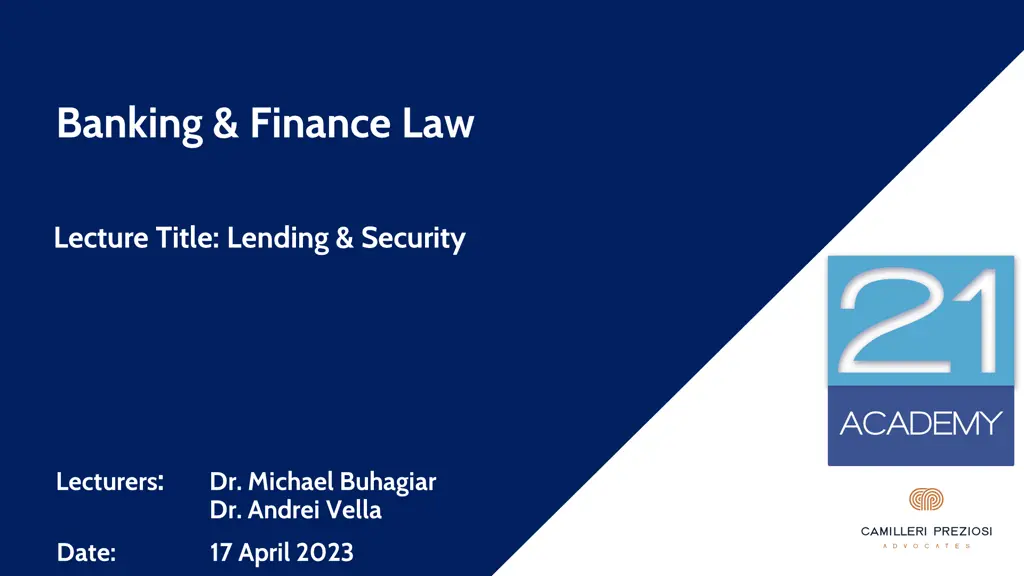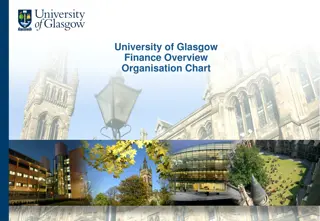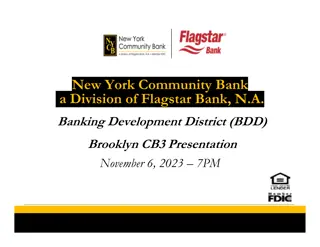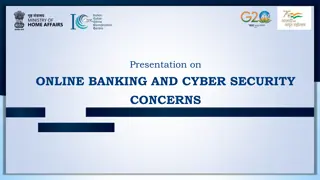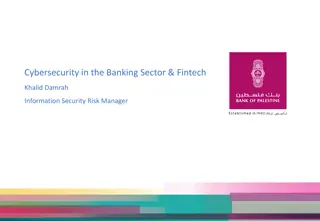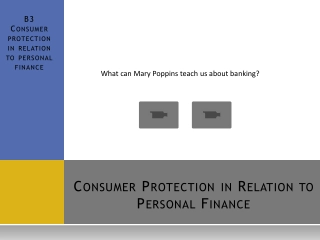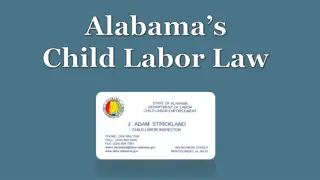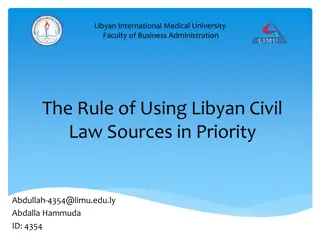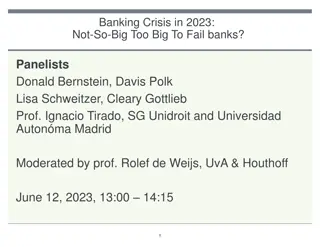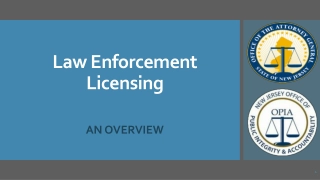Banking & Finance Law
Join our diploma program to learn about lending and security in the context of banking and finance law. Explore topics such as guarantees, privileges, hypothecs, and financial collateral arrangements.
Download Presentation
Please find below an Image/Link to download the presentation.
The content on the website is provided AS IS for your information and personal use only. It may not be sold, licensed, or shared on other websites without obtaining consent from the author. Download presentation by click this link. If you encounter any issues during the download, it is possible that the publisher has removed the file from their server.
Presentation Transcript
Diploma in Law (Malta) Click to edit Master title style Banking & Finance Law Click to edit Master text styles Second level Third level Fourth level Fifth level Lecture Title: Lending & Security Lecturers: Date: Dr. Michael Buhagiar Dr. Andrei Vella 17 April 2023
Diploma in Law (Malta) Click to edit Master title style Contents Click to edit Master text styles Second level Third level Fourth level Fifth level Lending Guarantees Privileges & Hypothecs Pledge Security by Title Transfer Financial Collateral Arrangement Regulations
Diploma in Law (Malta) Click to edit Master title style Lending - Lending is intrinsic to the business of banking. The Banking Act defines the business of banking as follows: Click to edit Master text styles Second level Third level Fourth level Fifth level from the public withdrawable or repayable on demand or after a fixed period or after notice or who borrows or raises money from the public (including the borrowing or raising of money by the issue of debentures or debenture stock or other instruments creating or acknowledging indebtedness), in either case for the purpose of employing such money in whole or in part by lending to others or otherwise investing for the account and at the risk of the person accepting such money the business of a person who as set out in article 2A accepts deposits of money
Diploma in Law (Malta) Click to edit Master title style Lending (cont d) Click to edit Master text styles Second level Third level Fourth level Fifth level - Banks provide financing in a variety of ways including overdraft facilities, term loans, revolving loans, credit cards, letters of credit, factoring and financial leasing. - Core banking function - Crucial for economic growth and development
Diploma in Law (Malta) Click to edit Master title style Overdraft facilities Click to edit Master text styles Second level Third level Fourth level Fifth level entitled to overdraw account - What is an overdraft? - Written agreement customer not automatically - Reversal of the creditor debtor relationship - Interest is charged on amount by which account is overdrawn.
Diploma in Law (Malta) Click to edit Master title style - Customer may withdraw funds at its discretion up to maximum overdraft limit that has been agreed with the bank. Click to edit Master text styles Second level Third level Fourth level Fifth level discretion. - Amounts overdrawn may be repaid by the customer at its - Repayable on demand. - Use of overdrafts in practice.
Diploma in Law (Malta) Click to edit Master title style Term Loans - Loan for a fixed period of time and for a specific purpose. - Granted for various purposes - Provide more predictability when compared to overdrafts in terms Click to edit Master text styles Second level Third level Fourth level Fifth level of repayment and interest to be paid. - Prepayments - Acceleration of the loan - No re-borrowing
Diploma in Law (Malta) Click to edit Master title style Other forms of financing Revolving Loans: a line of credit that allows a borrower to draw down and repay funds repeatedly, up to a pre-approved credit limit, typically with interest charged on the outstanding balance. Commonly used for general corporate and working capital purposes. Click to edit Master text styles Second level Third level Fourth level Fifth level Credit Cards: payment tool that allows the cardholder to make purchases up to a pre-approved limit and repay the balance in full or in part (typically each month).
Diploma in Law (Malta) Click to edit Master title style Other forms of financing (cont d) Factoring: arrangement whereby a company sells its accounts receivables, or outstanding invoices, to a third-party financial company called a factor at a discount. The factor provides the company with an immediate advance on the invoice amount, typically between 70% and 90% of the face value of the invoice. Click to edit Master text styles Second level Third level Fourth level Fifth level The factor then collects the full invoice amount from the customer when it is due and deducts their fee from the remaining amount before sending the remaining balance back to the company. Often used by companies that have slow-paying customers or need to improve their cash flow.
Diploma in Law (Malta) Click to edit Master title style Other forms of financing (cont d) Financial Leasing: alternative way of financing whereby a company (the lessor) purchases an asset on behalf of its customer (the lessee) and leases the asset to the lessee in return for a contractually agreed series of payments (the lease payments). Click to edit Master text styles Second level Third level Fourth level Fifth level The lessor maintains ownership of the asset while the lessee enjoys the use of the asset for the duration of the lease agreement, usually accompanied by an option to buy the asset at the end of the contract.
Diploma in Law (Malta) Click to edit Master title style Letters of credit and guarantees - A letter of credit is a letter from a bank guaranteeing that a buyer s payment to a seller will be received on time and for the correct amount. If the buyer is unable to make a payment on the purchase, the bank will be required to cover the full or remaining amount of the purchase. Click to edit Master text styles Second level Third level Fourth level Fifth level - Common in international trade when the reliability of contracting parties cannot be readily and easily determined. - Besides letters of credit banks also provide guarantees for other types of transactions such as performance bonds in connection with a tender. - Bank would charge a guarantee fee
Diploma in Law (Malta) Click to edit Master title style Interest - The Civil Code sets out the maximum interest rate that may be charged, which is 8%. This emerges from the provisions that deal with mutuum and also the provisions that deal with the subject matter of contracts generally. Click to edit Master text styles Second level Third level Fourth level Fifth level Article 986(2): any obligation to pay a rate of interest exceeding eight per cent per annum is void in regard to the excess. Article 1852: The rate of interest cannot exceed eight per cent per annum. Any higher interest agreed upon shall be reduced to the said rate, and if a higher interest than that fixed by law has been paid the excess shall be reduced from the capital.
Diploma in Law (Malta) - Interest Rate Exemption Regulations provide for certain exemptions from the 8% Click to edit Master title style limit, including: Debts and obligations where (a) such obligations arise under a contract governed or otherwise regulated by the law of a country other than Malta; (b) the agreed interest rate and/or compounding of interest are in accordance with international market conditions prevailing at the time that the debt or Click to edit Master text styles Second level Third level Fourth level Fifth level obligation has been contracted; and (c)the payor of interest is not a natural person; Security (including guarantees, suretyships, indemnities and other similar undertakings, pledges, privileges, hypothecs, mortgages and other collateral arrangements, whether by way of title transfer of otherwise) which is governed by Maltese law and which is entered for the purpose of, or in connection with, any transaction specified in the foregoing paragraph above
Diploma in Law (Malta) Click to edit Master title style - The regulations also have a general exemption that applies to credit and financial institutions. Click to edit Master text styles Second level Third level Fourth level Fifth level well as in the issue of debentures or debenture stock or other instruments creating oracknowledging indebtedness credit and financial institutions may determine the rate of interest payable on deposits held by credit institutions, and the rate of interest that they may charge on loans, advances and any other credit facility as
Diploma in Law (Malta) Click to edit Master title style - Base Rate vs Margin - LIBOR (London Interbank Offered Rate) was a key benchmark for setting the interest rates charged. It was set each day by collecting estimates from up to 18 global banks on the interest rates they would charge for different loan maturities, given their outlook on local economic conditions. - LIBOR Scandal - SOFR (Secured Overnight Financing Rate) - based on the rates U.S. financial institutions pay each other for overnight loans. - In the EU EURIBOR (Euro Interbank Offered Rate) is used similar to LIBOR in that it is based on the interest rate at which credit institutions (in the EU) lend money to each other. Click to edit Master text styles Second level Third level Fourth level Fifth level
Diploma in Law (Malta) Click to edit Master title style Guarantees & Security - We broadly distinguish between guarantees and security. A guarantee is an undertaking towards a creditor to satisfy a third party's obligation, if that third party fails to satisfy the obligation. Security interests on the other hand grant the creditor a real right in the property being secured by the relevant security arrangement and ranking, such that the creditor may Click to edit Master text styles Second level Third level Fourth level Fifth level obtain payment out of such property. - The property of a debtor is the common guarantee of his creditors, all of whom have an equal right over such property, unless there exist between them lawful causes of preference or there shall have been a transfer of any property by way of security. The lawful causes of preference are privileges, hypothecs and the benefit of the separation of estates.
Diploma in Law (Malta) Click to edit Master title style Suretyship Click to edit Master text styles Second level Third level Fourth level Fifth level it himself. - Under Maltese law a guarantee as previously described would fall within the definition of suretyship under the Civil Code: Article 1925: Suretyship is a contract whereby a person binds the creditor to satisfy the obligation of another person, if the latter fails to satisfy himself towards - Ancillary nature of suretyship - Suretyship cannot exceed what is due by the debtor, nor be contracted under more onerous conditions. However, it would extend to all accessories of the debt, including expenses necessarily incurred for obtaining payment provided the creditor.
Diploma in Law (Malta) Click to edit Master title style - Default position is that the surety is only bound to pay in the event of the default of the principal debtor whose property must first be discussed known as the benefit of discussion. Click to edit Master text styles Second level Third level Fourth level Fifth level not apply), such as where the surety has renounced such benefit, if the surety has bound himself jointly and severally with the debtor or if the debtor has become insolvent. - Exceptions to the default position (i.e. where the benefit of discussion does - Article the Civil Code explicitly provides that in commercial matters the surety is always, in the absence of an agreement to the contrary presumed to be bound jointly and severally with the debtor (article 1941). The Commercial Code contains an analogous provision in article 115 thereof.
Diploma in Law (Malta) Click to edit Master title style HSBC vs Frank Dimech et - HSBC had granted a loan to a company called Green Apple Advertising Agency Limited and the obligations under the loan were guaranteed by the defendants. The defendants argued, amongst other things, that before claiming under the guarantee the bank should have tried to recover the amount due directly from Green Apple (therefore claiming the benefit of discussion). - The court referred to article 1941 of the Civil Code and explained that in commercial matters the surety is presumed to be jointly and severally bound with the principal Click to edit Master text styles Second level Third level Fourth level Fifth level debtor. Given this presumption the defendants would need to prove that the guarantee was not given in connection with a commercial matter. - In the case at hand it was clear that the guarantee was given in connection with a commercial matter and that therefore the guarantors had bound themselves jointly and severally with Green Apple, and consequently they could not rely on the benefit of discussion. The bank could choose therefore choose who to claim against and did not need to first discuss the property of Green Apple. All the bank needed to prove was that the principal debtor had not paid. The court held that this was sufficiently proven by the bank and ordered that the guarantors pay to the bank the amounts due under the guarantee.
Diploma in Law (Malta) Click to edit Master title style - More than one surety for the same debtor and the same debt -each one is liable for the full amount. However each one may demand that the creditor should divide his action and reduce it to the share due by each surety (the benefit of division). Click to edit Master text styles Second level Third level Fourth level Fifth level renounced or where the surety has bound himself jointly and severally with the debtor. - When the benefit of division cannot be claimed either where it has been - If, at the time when one of the sureties has obtained such division, some of them are insolvent he is liable proportionately for the shares of those who are insolvent; but no claim can be made against him in respect of the share of any other surety who becomes insolvent subsequently to the division (article 1938).
Diploma in Law (Malta) Click to edit Master title style - A surety who has paid has a right of relief against the principal debtor (article 1942). This right of relief shall extend both to the capital and to the interest and expenses. The surety may also claim interest and damages. Click to edit Master text styles Second level Third level Fourth level Fifth level - However where the principal debtor has also paid, or was in possession of means that would have enabled him to have the debt declared extinct, and the surety did not notify the principal debtor of payment, then the surety will not have a right of relief against the principal debtor. However the surety would have a right of recovery against the creditor. - In addition a surety who has paid the debt succeeds ipso jure to all the rights which the creditor had against the debtor. - When there are several principal debtors jointly and severally bound for the same debt, the person who stands surety for all of them, has against each one of them a right of relief for the whole of the amount he has paid.
Diploma in Law (Malta) Click to edit Master title style - How suretyship is extinguished underlying obligation being satisfied or extinguished and merger of debtor and surety. Click to edit Master text styles Second level Third level Fourth level Fifth level creditor cannot take place owing to the fault of the creditor; (b) the creditor releases a co surety without the consent of the other sureties (to the extent of the share of the surety so released). - The surety is also released if: (a) subrogation to the rights of the
Diploma in Law (Malta) Click to edit Master title style First Demand Guarantees - Emerge from practice rather than legislation and are an exception to the rule / principle that guarantees are ancillary to the principal obligation being guaranteed. Click to edit Master text styles Second level Third level Fourth level Fifth level - In this type of guarantee the guarantor effectively binds itself to pay to the bank up to a maximum amount upon first demand by the bank. The guarantor cannot claim or ask to verify whether any amount under the guaranteed obligation has actually fallen due and the guarantee is deemed to be a separate obligation and autonomous from the obligation being guaranteed.
Diploma in Law (Malta) Click to edit Master title style Clarosa Hotels Limited vs APS Bank Limited et Plaintiffs had requested and obtained a bank guarantee from BOV in favour of APS. Guarantee provided that BOV had to pay any amount due Click to edit Master text styles Second level Third level Fourth level Fifth level thereunder when requested by APS and that BOV did not have to verify whether the claim by APS was justified or not. APS claimed payment under the guarantee and BOV proceeded with said payment. Defendants claimed that BOV should not have paid under the guarantee. Court confirmed autonomous nature of the guarantee and explained that this emerges from banking practice.
Diploma in Law (Malta) Click to edit Master title style Privileges - Privilege is a right of preference which the nature of a debt confers upon a creditor over the other creditors, including hypothecary creditors. Click to edit Master text styles Second level Third level Fourth level Fifth level - Privileges may exist over movables as well as over immovables. - General Privilege vs Special Privilege
Diploma in Law (Malta) Click to edit Master title style - The privileged debts over all property in general, are: Click to edit Master text styles Second level Third level Fourth level Fifth level (c)death-bed expenses (d)wages of servants (e)supplies of provisions (a) judicial costs (b)funeral expenses;
Diploma in Law (Malta) Click to edit Master title style - The following debts would entitle the creditor to a special privilege over particular movables: (a) The debt due to the pledgee over the thing that he holds as a pledge; (b) The debt due to a hotel-keeper for accommodation provided or supplies furnished to a guest, over the effects of such guest, so long as such effects exist in the hotel or house of the hotel-keeper; (c) The debt due for the carriage of goods, over the goods carried; (d) The debt due in respect of the price of a thing and the debt due for labour, supplies or expenses, bestowed, furnished or incurred in the production or for the preservation or improvement of a thing, over the thing itself. This privilege applies also to the debt due to the advocate and legal procurator for their fees in respect o f the action for the recovery of a thing, over the thing itself, if recovered; as well as to the debt due to the person disbursing the expenses incurred in such action; and (e) The debt due to the dominus for ground-rent, and the debt due to the lessor f or the rent of an immovable, over the fruits, and over the value of all things which serve for the furnishing or stocking, or for the cultivation of the tenement, to whomsoever such fruits or other things may belong. Click to edit Master text styles Second level Third level Fourth level Fifth level
Diploma in Law (Malta) Click to edit Master title style - The following debts would entitle the creditor to a special privilege over particular movables: (a) The debt due to the pledgee over the thing that he holds as a pledge; (b) The debt due to a hotel-keeper for accommodation provided or supplies furnished to a guest, over the effects of such guest, so long as such effects exist in the hotel or house of the hotel-keeper; (c) The debt due for the carriage of goods, over the goods carried; (d) The debt due in respect of the price of a thing and the debt due for labour, supplies or expenses, bestowed, furnished or incurred in the production or for the preservation or improvement of a thing, over the thing itself. This privilege applies also to the debt due to the advocate and legal procurator for their fees in respect o f the action for the recovery of a thing, over the thing itself, if recovered; as well as to the debt due to the person disbursing the expenses incurred in such action; and (e) The debt due to the dominus for ground-rent, and the debt due to the lessor f or the rent of an immovable, over the fruits, and over the value of all things which serve for the furnishing or stocking, or for the cultivation of the tenement, to whomsoever such fruits or other things may belong. Click to edit Master text styles Second level Third level Fourth level Fifth level
Diploma in Law (Malta) - The privileged creditors over immovables are: Click to edit Master title style (a) the dominus, over the dominium utile of the emphyteutical tenement, for the debt due to him by the emphyteuta in respect of ground-rent and for the performance of the other obligations arising from the emphyteutical contract; Click to edit Master text styles Second level Third level Fourth level Fifth level and the price of their work; (b) architects, contractors, masons and other workmen, over the immovable constructed, reconstructed or repaired, for debts due to them in respect of the expenses The same privilege is also competent to the person who has supplied money or materials for the construction, reconstruction or repair of the immovable, or for the payment of the workmen employed on such work. The same privilege also competent to a third party in possession, over the immovable of which he has been dispossessed, for the repairs and improvements made in or on such immovable.
Diploma in Law (Malta) (c) the vendor over the immovable sold by means of a public deed, for the whole or the Click to edit Master title style residue of the price, or for the performance of the covenants stipulated in the deed of sale. Click to edit Master text styles Second level Third level Fourth level Fifth level The same privilege is competent to the person who has, by means of a public deed, supplied in whole or in part the money for the payment of the price agreed upon, provided it is shown by the deed of loan that the money was supplied for that purpose, and it is proved that the money taken on loan has been paid to the vendor. (d) co-heirs and other co-partitioners, over the immovables which were the subject of the partition, in case of eviction of the immovables divided between them, and for any compensation or owelty of partition; (e)the advocate and the legal procurator, for the fees due to them for their services in the action for the recovery of the immovable, and the person disbursing the expenses of the said action, over the immovable, if recovered.
Diploma in Law (Malta) Click to edit Master title style Hypothecs -Hypothec is a right created over the property of a debtor or of a third party, for the benefit of the creditor, as security for the fulfilment of an obligation. Click to edit Master text styles Second level Third level Fourth level Fifth level -General vs Special Hypothecs -Effects of hypothec when property secured is transferred to a third party.
Diploma in Law (Malta) Click to edit Master title style Hypothecs (cont d) - Hypothecs are either legal, judicial or conventional. Click to edit Master text styles Second level Third level Fourth level Fifth level (a) Wife has a general legal hypothec over the property of the husband over the property of the husband for the dowry settled by means of a public deed prior to the marriage; (b) A minor has a general legal hypothec over the property of the parent to whose authority he is subject in respect of the liability contracted by such parent in the administration of the property of the minor; (c) Children and other descendants have also a general legal hypothec over the property of their surviving ascendant in case the said ascendant contracts another marriage; (d) Persons subject to tutorship or curatorship have a general legal hypothec over the property of the tutors or curators, for the liability of the latter in respect of their administration, as from the day on which such tutors or curators have accepted the office of tutor or curator; (e) The creditor who has a privilege over an immovable, has a special legal hypothec over the immovable subject to the privilege. - Legal hypothec arises by operation of law. Civil code sets out the instances where a legal hypothec is granted, namely:
Diploma in Law (Malta) Click to edit Master title style Hypothecs (cont d) Click to edit Master text styles Second level Third level Fourth level Fifth level (b)awards of arbitrators, an executive title and decisions given by courts outside Malta, in favour of the parties obtaining such awards or decisions, provided the execution thereof has been ordered by a judgment of the competent court in Malta. - Judicial hypothec originates from: (a)judgements given by any of of the courts of Malta in favour of the parties obtaining such judgments; - Conventional hypothec is created by contract, specifically by public deed.
Diploma in Law (Malta) Click to edit Master title style Preservation of Privileges and Hypothecs - Special privileges over immovables are ineffectual unless registered in the Public registry within the time of 2 months. - General privileges and special privileges over movables are not subject to registration. Click to edit Master text styles Second level Third level Fourth level Fifth level - Hypothecs are not effectual unless registered in the Public Registry, and they do not rank except from the date of registration. - Article 2042 sets out the particulars that the note of registration must refer to. - Registration of privileges and hypothecs is valid for 30 years, unless renewed. - If renewed after lapse of 30 years, the privilege or hypothec will rank only from the date of renewal.
Diploma in Law (Malta) Waiver, postponement, reduction and Click to edit Master title style cancellation - 1996A: It shall be lawful for a creditor to subordinate, postpone, waive or otherwise modify his existing or future rights of payment, enforcement, ranking and other similar existing or future rights in favour of another person. - Reduction or cancellation may be made with the consent of a creditor given in a public deed. - Consent of creditor not required in case of a judgement providing for the total/partial extinguishment of the underlying debt, that has become a res judicata. - Can also be ordered by the court (a) in case of a general legal hypothec or a judicial hypothec if it is shown that the restriction of the registration may be done without injuring the interests of the property; or (b) if it is not shown that the registration was made for a lawful cause. Click to edit Master text styles Second level Third level Fourth level Fifth level
Diploma in Law (Malta) Click to edit Master title style Extinguishment of Privileges and Hypothecs - Privileges and hypothecs are extinguished by: Click to edit Master text styles Second level Third level Fourth level Fifth level (b) Renunciation by the creditor; (c) Court procedure; (d) Prescription (a) The extinguishment of the underlying / principal obligation;
Diploma in Law (Malta) Click to edit Master title style Ranking of privileges and hypothecs - The Civil Code sets out the order of priority as follows: Click to edit Master text styles Second level Third level Fourth level Fifth level (e) the special privilege in respect of the debt due for the carriage of goods, over the good carried; (f) The special privileges in respect of (i) the debt due for the price of the thing over the thing itself; (ii) the debt due to the dominus or the lessor for ground-rent or rent (as applicable). (i) and (ii) rank equally. (g) The special privileges over immovables in the order set out in article 2010, provided that the privilege set out in paragraph (b) relating to architects shall rank with preference over the debt due to the dominus in (a) where the debt due is in respect of repairs necessary for the preservation of the immovable. (a) (b) (c) (d) The special privilege granted the pledgee over the thing pledged; The general privilege in respect of judicial costs, funeral expenses and death-bed expenses; The special privilege granted to the hotel keeper over the effects of the hotel guest; The general privilege in respect of wages of servants and supplies of provision; - Hypothecs rank after privileges and rank as from the date of registration. If more than one hypothec is registered on the same day they will rank equally. - Privileged or hypothecary debts that rank equally are paid ratably.
Diploma in Law (Malta) Click to edit Master title style Pledge - Defined as a contract created as a security for an obligation. The pledge may be given either by the debtor himself or by a third party for the debtor. - May be granted over movable things and debts, and other rights relating to movable things. In practice we mostly see pledges over shares, Click to edit Master text styles Second level Third level Fourth level Fifth level accounts, insurance policies and debts. - Constituted by delivery to the creditor of the pledged object or the document conferring exclusive right to the disposal of the thing. May also be delivered to a third party and placed in custody. - Pledge is therefore possessory in nature, and the pledgee is liable for loss or deterioration of the pledged thing caused by his negligence.
Diploma in Law (Malta) Click to edit Master title style Pledge (cont d) - Confers upon the pledgee the right to obtain payment out of the thing pledged with privilege over other creditors. - In case of pledge of debts, the special privilege will not arise unless Click to edit Master text styles Second level Third level Fourth level Fifth level the debtor of the pledged debt is notified by judicial act or acknowledges the pledge. - Pledgee may only sell the pledged thing to obtain payment under the authority of the court. - Retention of pledge
Diploma in Law (Malta) Click to edit Master title style Pledge of shares - Regulated by article 122 of the Companies Act. - In case of a private company, its shares may only be pledged if its M&As explicitly allow for the shares to be pledged. - Pledge is constituted by means of a written agreement. In addition: Click to edit Master text styles Second level Third level Fourth level Fifth level (a) the company whose shares are pledged must acknowledge the pledge and cause same to be entered into its register of members; (b) the pledge will only be effective vis- -vis third parties upon registration by the Registrar of the Form T2. - Any transfer of the pledged shares without the consent of the pledgee is null and void.
Diploma in Law (Malta) Click to edit Master title style Pledge of shares (cont d) - Exercise of rights over the shares. - Methods of enforcement: judicial sale by auction in accordance with the Civil Code, disposal or appropriation. - Pledgee may only enforce after notice by judicial act has been given to Click to edit Master text styles Second level Third level Fourth level Fifth level the pledgor and the company. - Valuation of pledged shares for purposes of enforcement by agreement between the pledgor and the pledgee after service of the notice of default. - Pre emption rights - Pledge of shares of a company listed on a regulated market in Malta: (a) requirement to deliver a certified copy of the pledge agreement to the MSE or other relevant regulated market; and (b) upon enforcement shares are to be sold through a duly authorised person in terms of the Investment Services Act.
Diploma in Law (Malta) Click to edit Master title style Pledge of shares (cont d) - The pledgee shall be obliged to seek the best price being not less than their fair value. In the event that a buyer cannot be found for the securities at their fair value, the pledgee shall apply to the court for the securities to be sold at less than their fair value. Click to edit Master text styles Second level Third level Fourth level Fifth level - In the exercise of his rights, the pledgee shall only sell or appropriate such number of securities as are needed to raise sufficient proceeds to repay the debt due. All remaining shares shall be released to the pledgor. - Termination of pledge
Diploma in Law (Malta) Click to edit Master title style Pledge of accounts - Constituted by means of a written agreement. Typically in practice the pledgor is required to deliver to the pledgee the bank statements in respect of the pledged account. Click to edit Master text styles Second level Third level Fourth level Fifth level - Acknowledgement of account bank. - Use of account throughout the term of the pledge. - Enforcement through appropriation of balances held in the pledged account. - Pledge extends to all monies deposited in the account.
Diploma in Law (Malta) Click to edit Master title style Pledge of accounts (cont d) - Adrian Vella Petroni et vs HSBC plc et (Court of Appeal judgement in October 2022). - HSBC had provided finance to Gaetano Savery u Richline Savery Testa (who were also defendants in this case), and the loans were secured by a pledge of account that was provided by the plaintiffs. Click to edit Master text styles Second level Third level Fourth level Fifth level - Pledge was over a fixed term deposit account of EURO 100,000. The pledge agreement also provided that the pledors could not allow the balance of the account to fall below EURO 100,000. - The term of the account eventually lapsed and the balance was transferred to another account of the pledgor held with HSBC. - The borrowers defaulted on the loan and HSBC enforced the pledge by appropriating the balance held in the account.
Diploma in Law (Malta) Click to edit Master title style - Amongst the claims raised, the pledgors argued that the bank could not enforce the pledge since the pledge was constituted over a different account. - The court held that since the agreement provided that the pledge extended to secure the balances in the account, and that the pledgor could not allow the balance of the account to fall below EURO 100,000, the pledge granted was over the said balance rather than the account itself. - The pledgors also argued that the appropriation by the bank was unlawful as it should have sought court authorization. Whilst the court of first instance accepted this argument, the court of appeal overturned this party of the decision, confirming that were the thing pledged is money, the pledgee may appropriate the necessary amount of money to satisfy the debt due to it without authorization from the court. Click to edit Master text styles Second level Third level Fourth level Fifth level
Diploma in Law (Malta) Click to edit Master title style Security by title transfer - Definition: contract whereby the debtor, or a third party for the debtor, transfers or assigns movable things, whether by nature of by operation of law, so as to secure a present or future obligation, to a creditor or creditors. Click to edit Master text styles Second level Third level Fourth level Fifth level - Contents of the agreement: (a) property being transferred (b) the secured obligations (c) the rights of the transferee in case of a default
Diploma in Law (Malta) Click to edit Master title style Security by title transfer (cont d) - When property being transferred consists of debts agreement should include a list of debts. When a large amount of debts are being transferred or a particular class of debts present or future are being transferred, the agreement should specify and indicate one Click to edit Master text styles Second level Third level Fourth level Fifth level of the features from each of the columns below: Features A Features B The type of debt or asset or contract giving rise to the debt the time period during which the debt may arise The Class or type of debtors the repayment period when the debts may fall due the assets, including future assets, which give rise to the receivables
Diploma in Law (Malta) Click to edit Master title style Security by title transfer (cont d) - The agreement may also allow for the debtor to use the transferred property. - Transfer is effective between the parties upon entry into the Click to edit Master text styles Second level Third level Fourth level Fifth level security agreement. However in the case of a transfer debts and rights against an obligor the transfer will only be effective in relation to third parties if the obligor has been notified or acknowledges the transfer. - Effect of the transfer is that the creditor is deemed to be the absolute owner of the property transferred. Consequently the transfer will be enforceable notwithstanding the insolvency or bankruptcy of the debtor.
Diploma in Law (Malta) Click to edit Master title style Security by title transfer (cont d) - Notwithstanding the above, the creditor is not permitted to make use of the property transferred (unless permitted to do so in terms of the agreement), and is liable to the transferor for the loss or deterioration of the property arising from his negligence. Click to edit Master text styles Second level Third level Fourth level Fifth level - The transferee is deemed to be a fiduciary and use of the property other than in accordance with the security agreement is deemed to be a breach of fiduciary obligations.
Diploma in Law (Malta) Click to edit Master title style Security by title transfer (cont d) - Enforcement: sale, set-off or judicial sale by auction, in each case after giving notice in writing to the debtor and the transferor of the property. Click to edit Master text styles Second level Third level Fourth level Fifth level - Valuation of property transferred for the purposes of enforcement by way of set-off shall be established by agreement between the parties or in the absence of such agreement it shall be the market value of the property. Where there is no market value, the value shall be established by an independent person competent to value the property.
